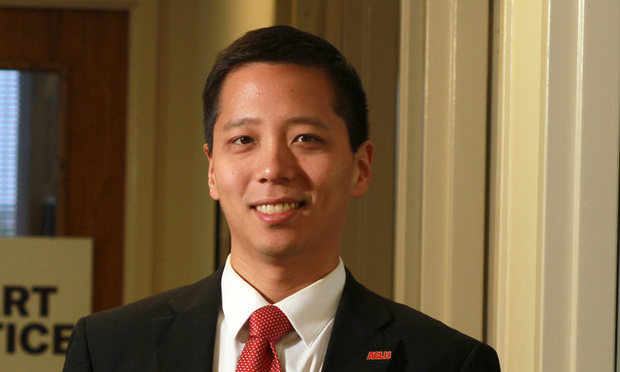Reproductive Justice Groups Sue Kemp to Block Abortion Ban
“This law is an affront to the dignity and health of Georgians,” said a 38-page complaint filed in federal court Friday.
June 28, 2019 at 09:17 AM
5 minute read
 Sean Young, ACLU of Georgia (Photo: John Disney/ALM)
Sean Young, ACLU of Georgia (Photo: John Disney/ALM)
SisterSong Women of Color Reproductive Justice Collective and numerous others sued Georgia Gov. Brian Kemp, Attorney General Chris Carr and prosecutors around the state in federal court Friday seeking to block enforcement of an abortion ban set to go into effect Jan. 1.
The 38-page complaint filed in U.S. District Court for the Northern District of Georgia in Atlanta is a constitutional challenge to House Bill 481, “which bans practically all abortions,” the filing said. “This law is an affront to the dignity and health of Georgians.”
The complaint said the law is “in particular an attack on low-income Georgians, Georgians of color, and rural Georgians, who are least able to access medical care and least able to overcome the cruelties of this law.” The lead plaintiff, SisterSong, is a Georgia-based nonprofit organization formed in 1997 by 16 groups led by and representing indigenous, black, Latinx, and Asian American women, as well as trans people.
“By asserting the human right to reproductive justice, SisterSong works to build an effective network of individuals and organizations addressing institutional policies, systems, and cultural practices that limit the reproductive lives of marginalized people,” the lawsuit said.
The other plaintiffs include Feminist Women's Health Center of DeKalb County, Planned Parenthood Southeast, other medical facilities around the state and physicians and staff suing on behalf of themselves and their patients.
“Georgians face a critical shortage of reproductive health care providers, including obstetrician-gynecologists, and the rate at which Georgians, particularly Black Georgians, die from pregnancy-related causes is among the highest in the nation,” the complaint said. “Rather than working to end those preventable deaths, and rather than honoring Georgians' reproductive health care decisions, the Legislature has instead chosen to criminalize abortion from the earliest stages of pregnancy.”
The Legislature passed the ban in March. The governor signed it in May. It will be the attorney general's responsibility to defend the state.
The governor's office declined to comment Friday, referring inquiries to the attorney general. The AG's spokeswoman said, “We cannot comment on pending litigation.”
“The law criminalizes pre-viability abortions in direct conflict with Roe v. Wade, 410 U.S. 113 (1973), and nearly a half century of Supreme Court precedent reaffirming Roe's central holding,” the complaint said. “Specifically, it criminalizes abortion after embryonic cardiac activity is detectable, which generally occurs around six weeks in pregnancy, when many people are unaware they are pregnant. The law undermines a woman's 'ability … to participate equally in the economic and social life of the Nation,' which 'has been facilitated by their ability to control their reproductive lives.' Planned Parenthood v. Casey, 505 U.S. 833, 856 (1992).”
“These are serious decisions,” Andrea Young, a lawyer and the executive director of the American Civil Liberties Union of Georgia, told the Daily Report. “Roe very carefully weighs at what point the government has an interest.” Before viability, she said, “government does not have an interest that outweighs the right to privacy and the ability of women to decide.”
She said the “heartbeat” language for “embryonic cardiac activity” is “intended to obscure how far from viability this line is being drawn.”
“Everyone trying to recruit talent to their law firms should be worried,” she said. “Atlanta has this incredible reputation as a place that is welcoming of diversity. What matters is what you bring to the table. Hard work. Brains. Now we've got the Legislature saying 'no, we have a group of second-class citizens who don't get to control their lives.'”
The plaintiffs are being represented by lawyers with the American Civil Liberties Union in Atlanta and New York and with Planned Parenthood in Washington and New York.
“It's a team effort. Everyone is working really hard on this,” ACLU Georgia Legal Director Sean J. Young told the Daily Report.
He said the strategy is to sue every state official who has the authority to enforce the law, press criminal charges or impose professional punishments on medical providers. He said Georgia law gives the governor the power to direct DAs and the AG to prosecute, even if they disagree with a law. So all prosecutors in areas where the plaintiffs have business have been sued. So have the members of the Georgia Composite Medical Board and the commissioner of the Department of Public Health, because of their authority over doctors.
The complaint seeks a preliminary injunction in advance of the Jan. 1 effective date and a permanent injunction restraining the defendants from enforcing the law. The complaint also calls on the court to enter a judgment declaring that H.B. 481 violates the 14th Amendment and to award attorney fees and costs.
The complaint also provides details of health risks of pregnancy not addressed by the ban, which allows exceptions only for rape when a police report is filed, medical emergencies imminently threatening the mother's life or diagnoses of medical futility for the child.
“Forcing women to continue their pregnancy against their will can expose them to serious health risks that are not covered by the narrow emergency exception in the law,” Young said. “This bill was designed to support the abortion ban. The sponsors erroneously believed that using personhood could get them out from under Roe v. Wade. But thankfully, politicians cannot rewrite the Constitution.”
This content has been archived. It is available through our partners, LexisNexis® and Bloomberg Law.
To view this content, please continue to their sites.
Not a Lexis Subscriber?
Subscribe Now
Not a Bloomberg Law Subscriber?
Subscribe Now
NOT FOR REPRINT
© 2025 ALM Global, LLC, All Rights Reserved. Request academic re-use from www.copyright.com. All other uses, submit a request to [email protected]. For more information visit Asset & Logo Licensing.
You Might Like
View All
Law Firms Expand Scope of Immigration Expertise Amid Blitz of Trump Orders
6 minute read
Bass Berry & Sims Relocates to Nashville Office Designed to Encourage Collaboration, Inclusion
4 minute read
Gunderson Dettmer Opens Atlanta Office With 3 Partners From Morris Manning
3 minute read
Trending Stories
- 1Uber Files RICO Suit Against Plaintiff-Side Firms Alleging Fraudulent Injury Claims
- 2The Law Firm Disrupted: Scrutinizing the Elephant More Than the Mouse
- 3Inherent Diminished Value Damages Unavailable to 3rd-Party Claimants, Court Says
- 4Pa. Defense Firm Sued by Client Over Ex-Eagles Player's $43.5M Med Mal Win
- 5Losses Mount at Morris Manning, but Departing Ex-Chair Stays Bullish About His Old Firm's Future
Who Got The Work
J. Brugh Lower of Gibbons has entered an appearance for industrial equipment supplier Devco Corporation in a pending trademark infringement lawsuit. The suit, accusing the defendant of selling knock-off Graco products, was filed Dec. 18 in New Jersey District Court by Rivkin Radler on behalf of Graco Inc. and Graco Minnesota. The case, assigned to U.S. District Judge Zahid N. Quraishi, is 3:24-cv-11294, Graco Inc. et al v. Devco Corporation.
Who Got The Work
Rebecca Maller-Stein and Kent A. Yalowitz of Arnold & Porter Kaye Scholer have entered their appearances for Hanaco Venture Capital and its executives, Lior Prosor and David Frankel, in a pending securities lawsuit. The action, filed on Dec. 24 in New York Southern District Court by Zell, Aron & Co. on behalf of Goldeneye Advisors, accuses the defendants of negligently and fraudulently managing the plaintiff's $1 million investment. The case, assigned to U.S. District Judge Vernon S. Broderick, is 1:24-cv-09918, Goldeneye Advisors, LLC v. Hanaco Venture Capital, Ltd. et al.
Who Got The Work
Attorneys from A&O Shearman has stepped in as defense counsel for Toronto-Dominion Bank and other defendants in a pending securities class action. The suit, filed Dec. 11 in New York Southern District Court by Bleichmar Fonti & Auld, accuses the defendants of concealing the bank's 'pervasive' deficiencies in regards to its compliance with the Bank Secrecy Act and the quality of its anti-money laundering controls. The case, assigned to U.S. District Judge Arun Subramanian, is 1:24-cv-09445, Gonzalez v. The Toronto-Dominion Bank et al.
Who Got The Work
Crown Castle International, a Pennsylvania company providing shared communications infrastructure, has turned to Luke D. Wolf of Gordon Rees Scully Mansukhani to fend off a pending breach-of-contract lawsuit. The court action, filed Nov. 25 in Michigan Eastern District Court by Hooper Hathaway PC on behalf of The Town Residences LLC, accuses Crown Castle of failing to transfer approximately $30,000 in utility payments from T-Mobile in breach of a roof-top lease and assignment agreement. The case, assigned to U.S. District Judge Susan K. Declercq, is 2:24-cv-13131, The Town Residences LLC v. T-Mobile US, Inc. et al.
Who Got The Work
Wilfred P. Coronato and Daniel M. Schwartz of McCarter & English have stepped in as defense counsel to Electrolux Home Products Inc. in a pending product liability lawsuit. The court action, filed Nov. 26 in New York Eastern District Court by Poulos Lopiccolo PC and Nagel Rice LLP on behalf of David Stern, alleges that the defendant's refrigerators’ drawers and shelving repeatedly break and fall apart within months after purchase. The case, assigned to U.S. District Judge Joan M. Azrack, is 2:24-cv-08204, Stern v. Electrolux Home Products, Inc.
Featured Firms
Law Offices of Gary Martin Hays & Associates, P.C.
(470) 294-1674
Law Offices of Mark E. Salomone
(857) 444-6468
Smith & Hassler
(713) 739-1250






